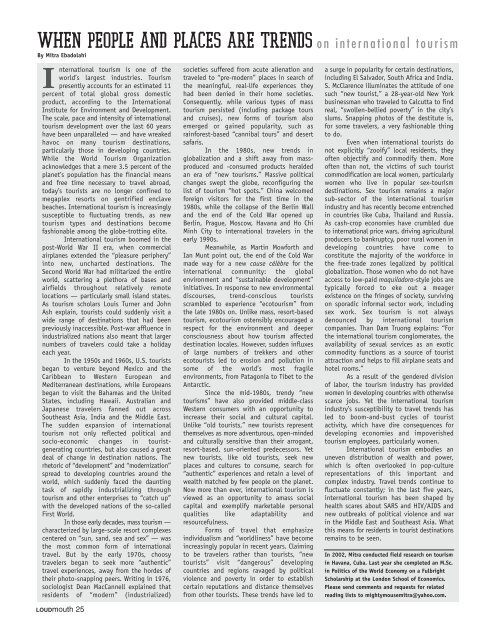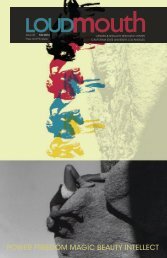judith “jack” halberstam on drag, gender and fashionable stupidity ...
judith “jack” halberstam on drag, gender and fashionable stupidity ...
judith “jack” halberstam on drag, gender and fashionable stupidity ...
You also want an ePaper? Increase the reach of your titles
YUMPU automatically turns print PDFs into web optimized ePapers that Google loves.
WHEN PEOPLE AND PLACES ARE TRENDS<br />
By Mitra Ebadolahi<br />
I<br />
nternati<strong>on</strong>al tourism is <strong>on</strong>e of the<br />
world’s largest industries. Tourism<br />
presently accounts for an estimated 11<br />
percent of total global gross domestic<br />
product, according to the Internati<strong>on</strong>al<br />
Institute for Envir<strong>on</strong>ment <strong>and</strong> Development.<br />
The scale, pace <strong>and</strong> intensity of internati<strong>on</strong>al<br />
tourism development over the last 60 years<br />
have been unparalleled — <strong>and</strong> have wreaked<br />
havoc <strong>on</strong> many tourism destinati<strong>on</strong>s,<br />
particularly those in developing countries.<br />
While the World Tourism Organizati<strong>on</strong><br />
acknowledges that a mere 3.5 percent of the<br />
planet’s populati<strong>on</strong> has the financial means<br />
<strong>and</strong> free time necessary to travel abroad,<br />
today’s tourists are no l<strong>on</strong>ger c<strong>on</strong>fined to<br />
megaplex resorts <strong>on</strong> gentrified enclave<br />
beaches. Internati<strong>on</strong>al tourism is increasingly<br />
susceptible to fluctuating trends, as new<br />
tourism types <strong>and</strong> destinati<strong>on</strong>s become<br />
fashi<strong>on</strong>able am<strong>on</strong>g the globe-trotting elite.<br />
Internati<strong>on</strong>al tourism boomed in the<br />
post-World War II era, when commercial<br />
airplanes extended the “pleasure periphery”<br />
into new, uncharted destinati<strong>on</strong>s. The<br />
Sec<strong>on</strong>d World War had militarized the entire<br />
world, scattering a plethora of bases <strong>and</strong><br />
airfields throughout relatively remote<br />
locati<strong>on</strong>s — particularly small isl<strong>and</strong> states.<br />
As tourism scholars Louis Turner <strong>and</strong> John<br />
Ash explain, tourists could suddenly visit a<br />
wide range of destinati<strong>on</strong>s that had been<br />
previously inaccessible. Post-war affluence in<br />
industrialized nati<strong>on</strong>s also meant that larger<br />
numbers of travelers could take a holiday<br />
each year.<br />
In the 1950s <strong>and</strong> 1960s, U.S. tourists<br />
began to venture bey<strong>on</strong>d Mexico <strong>and</strong> the<br />
Caribbean to Western European <strong>and</strong><br />
Mediterranean destinati<strong>on</strong>s, while Europeans<br />
began to visit the Bahamas <strong>and</strong> the United<br />
States, including Hawaii. Australian <strong>and</strong><br />
Japanese travelers fanned out across<br />
Southeast Asia, India <strong>and</strong> the Middle East.<br />
The sudden expansi<strong>on</strong> of internati<strong>on</strong>al<br />
tourism not <strong>on</strong>ly reflected political <strong>and</strong><br />
socio-ec<strong>on</strong>omic changes in touristgenerating<br />
countries, but also caused a great<br />
deal of change in destinati<strong>on</strong> nati<strong>on</strong>s. The<br />
rhetoric of “development” <strong>and</strong> “modernizati<strong>on</strong>”<br />
spread to developing countries around the<br />
world, which suddenly faced the daunting<br />
task of rapidly industrializing through<br />
tourism <strong>and</strong> other enterprises to “catch up”<br />
with the developed nati<strong>on</strong>s of the so-called<br />
First World.<br />
In those early decades, mass tourism —<br />
characterized by large-scale resort complexes<br />
centered <strong>on</strong> “sun, s<strong>and</strong>, sea <strong>and</strong> sex” — was<br />
the most comm<strong>on</strong> form of internati<strong>on</strong>al<br />
travel. But by the early 1970s, choosy<br />
travelers began to seek more “authentic”<br />
travel experiences, away from the hordes of<br />
their photo-snapping peers. Writing in 1976,<br />
sociologist Dean MacCannell explained that<br />
residents of “modern” (industrialized)<br />
LOUDmouth 25<br />
societies suffered from acute alienati<strong>on</strong> <strong>and</strong><br />
traveled to “pre-modern” places in search of<br />
the meaningful, real-life experiences they<br />
had been denied in their home societies.<br />
C<strong>on</strong>sequently, while various types of mass<br />
tourism persisted (including package tours<br />
<strong>and</strong> cruises), new forms of tourism also<br />
emerged or gained popularity, such as<br />
rainforest-based “cannibal tours” <strong>and</strong> desert<br />
safaris.<br />
In the 1980s, new trends in<br />
globalizati<strong>on</strong> <strong>and</strong> a shift away from massproduced<br />
<strong>and</strong> -c<strong>on</strong>sumed products heralded<br />
an era of “new tourisms.” Massive political<br />
changes swept the globe, rec<strong>on</strong>figuring the<br />
list of tourism “hot spots.” China welcomed<br />
foreign visitors for the first time in the<br />
1980s, while the collapse of the Berlin Wall<br />
<strong>and</strong> the end of the Cold War opened up<br />
Berlin, Prague, Moscow, Havana <strong>and</strong> Ho Chi<br />
Minh City to internati<strong>on</strong>al travelers in the<br />
early 1990s.<br />
Meanwhile, as Martin Mowforth <strong>and</strong><br />
Ian Munt point out, the end of the Cold War<br />
made way for a new cause célèbre for the<br />
internati<strong>on</strong>al community: the global<br />
envir<strong>on</strong>ment <strong>and</strong> “sustainable development”<br />
initiatives. In resp<strong>on</strong>se to new envir<strong>on</strong>mental<br />
discourses, trend-c<strong>on</strong>scious tourists<br />
scrambled to experience “ecotourism” from<br />
the late 1980s <strong>on</strong>. Unlike mass, resort-based<br />
tourism, ecotourism ostensibly encouraged a<br />
respect for the envir<strong>on</strong>ment <strong>and</strong> deeper<br />
c<strong>on</strong>sciousness about how tourism affected<br />
destinati<strong>on</strong> locales. However, sudden influxes<br />
of large numbers of trekkers <strong>and</strong> other<br />
ecotourists led to erosi<strong>on</strong> <strong>and</strong> polluti<strong>on</strong> in<br />
some of the world’s most fragile<br />
envir<strong>on</strong>ments, from Patag<strong>on</strong>ia to Tibet to the<br />
Antarctic.<br />
Since the mid-1980s, trendy “new<br />
tourisms” have also provided middle-class<br />
Western c<strong>on</strong>sumers with an opportunity to<br />
increase their social <strong>and</strong> cultural capital.<br />
Unlike “old tourists,” new tourists represent<br />
themselves as more adventurous, open-minded<br />
<strong>and</strong> culturally sensitive than their arrogant,<br />
resort-based, sun-oriented predecessors. Yet<br />
new tourists, like old tourists, seek new<br />
places <strong>and</strong> cultures to c<strong>on</strong>sume, search for<br />
“authentic” experiences <strong>and</strong> retain a level of<br />
wealth matched by few people <strong>on</strong> the planet.<br />
Now more than ever, internati<strong>on</strong>al tourism is<br />
viewed as an opportunity to amass social<br />
capital <strong>and</strong> exemplify marketable pers<strong>on</strong>al<br />
qualities like adaptability <strong>and</strong><br />
resourcefulness.<br />
Forms of travel that emphasize<br />
individualism <strong>and</strong> “worldliness” have become<br />
increasingly popular in recent years. Claiming<br />
to be travelers rather than tourists, “new<br />
tourists” visit “dangerous” developing<br />
countries <strong>and</strong> regi<strong>on</strong>s ravaged by political<br />
violence <strong>and</strong> poverty in order to establish<br />
certain reputati<strong>on</strong>s <strong>and</strong> distance themselves<br />
from other tourists. These trends have led to<br />
<strong>on</strong> internati<strong>on</strong>al tourism<br />
a surge in popularity for certain destinati<strong>on</strong>s,<br />
including El Salvador, South Africa <strong>and</strong> India.<br />
S. McClarence illuminates the attitude of <strong>on</strong>e<br />
such “new tourist,” a 28-year-old New York<br />
businessman who traveled to Calcutta to find<br />
real, “swollen-bellied poverty” in the city’s<br />
slums. Snapping photos of the destitute is,<br />
for some travelers, a very fashi<strong>on</strong>able thing<br />
to do.<br />
Even when internati<strong>on</strong>al tourists do<br />
not explicitly “zooify” local residents, they<br />
often objectify <strong>and</strong> commodify them. More<br />
often than not, the victims of such tourist<br />
commodificati<strong>on</strong> are local women, particularly<br />
women who live in popular sex-tourism<br />
destinati<strong>on</strong>s. Sex tourism remains a major<br />
sub-sector of the internati<strong>on</strong>al tourism<br />
industry <strong>and</strong> has recently become entrenched<br />
in countries like Cuba, Thail<strong>and</strong> <strong>and</strong> Russia.<br />
As cash-crop ec<strong>on</strong>omies have crumbled due<br />
to internati<strong>on</strong>al price wars, driving agricultural<br />
producers to bankruptcy, poor rural women in<br />
developing countries have come to<br />
c<strong>on</strong>stitute the majority of the workforce in<br />
the free-trade z<strong>on</strong>es legalized by political<br />
globalizati<strong>on</strong>. Those women who do not have<br />
access to low-paid maquiladora-style jobs are<br />
typically forced to eke out a meager<br />
existence <strong>on</strong> the fringes of society, surviving<br />
<strong>on</strong> sporadic informal sector work, including<br />
sex work. Sex tourism is not always<br />
denounced by internati<strong>on</strong>al tourism<br />
companies. Than Dam Tru<strong>on</strong>g explains: “For<br />
the internati<strong>on</strong>al tourism c<strong>on</strong>glomerates, the<br />
availability of sexual services as an exotic<br />
commodity functi<strong>on</strong>s as a source of tourist<br />
attracti<strong>on</strong> <strong>and</strong> helps to fill airplane seats <strong>and</strong><br />
hotel rooms.”<br />
As a result of the <strong>gender</strong>ed divisi<strong>on</strong><br />
of labor, the tourism industry has provided<br />
women in developing countries with otherwise<br />
scarce jobs. Yet the internati<strong>on</strong>al tourism<br />
industry’s susceptibility to travel trends has<br />
led to boom-<strong>and</strong>-bust cycles of tourist<br />
activity, which have dire c<strong>on</strong>sequences for<br />
developing ec<strong>on</strong>omies <strong>and</strong> impoverished<br />
tourism employees, particularly women.<br />
Internati<strong>on</strong>al tourism embodies an<br />
uneven distributi<strong>on</strong> of wealth <strong>and</strong> power,<br />
which is often overlooked in pop-culture<br />
representati<strong>on</strong>s of this important <strong>and</strong><br />
complex industry. Travel trends c<strong>on</strong>tinue to<br />
fluctuate c<strong>on</strong>stantly; in the last five years,<br />
internati<strong>on</strong>al tourism has been shaped by<br />
health scares about SARS <strong>and</strong> HIV/AIDS <strong>and</strong><br />
new outbreaks of political violence <strong>and</strong> war<br />
in the Middle East <strong>and</strong> Southeast Asia. What<br />
this means for residents in tourist destinati<strong>on</strong>s<br />
remains to be seen.<br />
In 2002, Mitra c<strong>on</strong>ducted field research <strong>on</strong> tourism<br />
in Havana, Cuba. Last year she completed an M.Sc.<br />
in Politics of the World Ec<strong>on</strong>omy <strong>on</strong> a Fulbright<br />
Scholarship at the L<strong>on</strong>d<strong>on</strong> School of Ec<strong>on</strong>omics.<br />
Please send comments <strong>and</strong> requests for related<br />
reading lists to mightymousemitra@yahoo.com.









